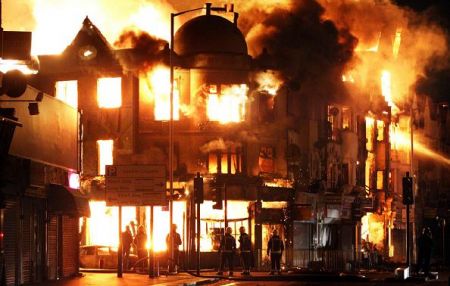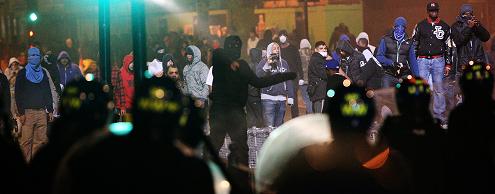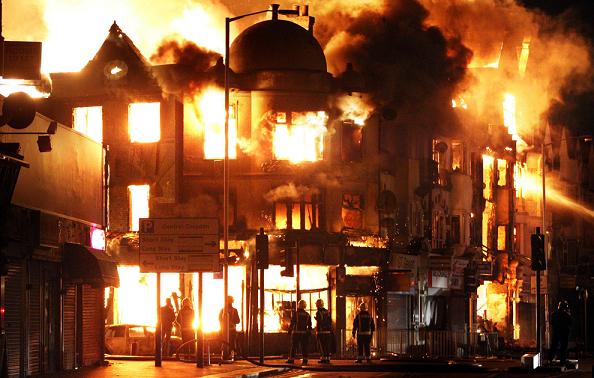In the words of Camus : “Every act of rebellion expresses a nostalgia for innocence and an appeal to the essence of being.” Well, not this one.

It’s only natural for everyone to swoop in with their own theories regarding the ongoing London riots. Attempts to contextualize conflicts, or any sort of civil disobedience (unrest, rather, in this case) are healthy; it means people are using their brains to grasp what the situation means, rather than mindlessly pandering to popular opinion.
I do feel however – and this is my own contextualization – that too many sluggish arguments have been made on both sides to either unfairly demonize the justified retaliation by the rioters against the indiscriminate police shooting of one Mark Duggan, or on the flipside to continuously shield an army of greedy criminals from reproach by categorically classifying them as victims of a “class struggle”. To put it quite frankly, I can’t find sense in any of these all-encompassing arguments; one certainly can’t frame the chain of cause-and-effects in such simplistic terms.
I say this as there is a growing trend of left-wing “loyalists” and sympathizers who have been quick to rally behind the rioters with defenses ranging from the social exclusion theory to outrage over austerity measures, the two of which have been the favourite scapegoats so far.
The former warrants significant merits – trying to comprehend a manic breakout exacerbated by a much wider social dysfunction requires a close look at the rioters’ own anti-social behavioral tendencies. Why are they so aggrieved, so disconnected from the society in which they grew up in? It probably boils down to the fact that they don’t even feel like they belong to their own communities; too deeply engulfed by the anti-establishment stance of their collective peers perhaps (most likely criminal gangs), or they have been denounced as hopeless thrash far too many times to bother proving otherwise. A darker side would be institutionalized racism where the ethnic minorities are concerned. Still, analysis branding their anarchy-fueled joyride as a “political statement” reads like a sadistic joke. At least four people have been killed, three of whom died protecting their community from looters.
What value are we placing on these innocent lives if we are to legitimize their murderers’ barbaric actions as valid dissent mechanisms?

The latter argument citing spending cuts as a factor is also very much up for debate, although I personally object to allowing such leeway to the socially-dispossessed; it’s heedless to make up reasons for those who are clearly acting like turds devoid of a reasonable man’s moral compass, regardless of the State’s flawed policy-making. If any attention is to be given following this line of argument, it is that the culture of welfare dependence in the UK has gone a wee bit too extreme. Judging by the violent fuss kicked up over what the rioters claim to be a loss of their “entitlements”, one should be hard-pressed to ask whether a reconciliation can ever be achieved between the clashing ideas of Britain’s welfare state model and the resulting contention made that it has inadvertently encouraged a disgustingly immature attitude amongst its dependents, which has led to what we have been witnessing over the past week.
Sadly, the actual protest, the actual “cause” reflecting the arguments made on the rioters’ behalf has long been swallowed whole by the mob of opportunistic crooks getting jump-started across cities, taking advantage of the anarchic chaos resulting from the early riots. These youths aren’t seeking attention to send their “message” across; they’re merely copycat rioters and looters guided by no worthy causes, with zilch sense of social responsibility. A bunch of power-hungry, angst-ridden schmucks tearing the city apart, just because they can. There exists no excuse for the senseless violence – beating people up as they please and intentionally causing harm to members of their own community are put together, illustrations of a whole different sort of rampant retaliation gone mad. No matter that they do not identify with those they have been hurting; a wretched value system beleaguered by the absence of the simplest show of humanity is not fit to be called a value system at all.
When extreme alienation proves so volatile and deadly, it ceases to become an accepted justification; such nihilistic outbursts should be recognized as stemming from the wills of criminals, and criminals only. Misguided sympathy towards these quarters who are unmistakably raging out of control under terribly noxious delusions will only serve to undermine the actual struggle : Resistance should be spirited and above all principled, not selfish and self-destructive.
“Rebellion without truth is like spring in a bleak, arid desert,” warned Khalil Gibran.

I refuse to romanticize this as a “rebellion by the disenfranchised “, but I’ll acknowledge that for the Tottenham rioters at least (who sparked the initial protests), their reaction to Mr. Duggan’s death and what they claim to be a systematic exclusion of their interests by the State certainly wasn’t fueled by anything less than a feeling of real exasperation. It is a pity then that their voices have been largely erased by current circumstances.
In spite of my aversion to mindless anarchy, I’d be a hypocrite to not admit that the swift labeling of the rioters as quite the “intelligent” looters by those still insisting on conjuring up imprudent masks for these allegedly marginalized groups has some resonance with me: “intelligent” because stealing from the rich supposedly gives meaning to the continued lawlessness – a thievery corporation of sorts for the masses. Not to give undue credit to these hooligans where it isn’t due – mugging helpless civilians and the use of physical force in their acts of petty thefts are inexcusable – but I choose to tread rather recklessly on shards of glass here in expressing my own reservations to harshly condemn the destruction of the upper middle-class consumerist, capitalistic symbols. Snapshots of broken display windows of thrashed out designer stores unashamedly give me a sort of perverse pleasure, akin to when the Black Bloc went on that delicious rampage against the Ritz during the UK Cuts protest.
Therein lies my own contradictions – I despise violence yet relish such displays of bold aggression. I find that sort of anarchy inspired (inevitable once allowing The Clash & co’s colourful ideas to seep into one’s logic throughout tiresome high school years), when I should be condemning it were I to be fair to my own opinions concerning the “politically-correct.” Surely I should stand resolutely by the context I myself have decided upon.
In any case, I can only judge if I myself were among those claiming to be the downtrodden; victimized and alienated by the faulty system which has resulted in a gaping hole of gross social inequality, robbing me of my opportunities, my future. Then only can I be allowed to say fairly whether I would’ve lashed out in the same (seemingly incommensurate) manner. What I do know though, is that my conscience will never permit me to turn against my own community, when my rage squarely lies with the State.
And yes, any ignorant punk who decides to equate these horrid riots to the peaceful rallies of the Malaysian society is just that – an ignorant punk.


I think our views are very similar then. I can assure you though, that in the UK, these "left-wing loyalist" you worry about are not being given much attention anywhere. The bigger problem in the UK is that too many sensible people on the left who are trying to understand the situation are being shut out by the suggestion they are condoning the violence, being mixed up with the "left-wing loyalist" you talk about. I'm glad that you are not trying to do that and I definitely see where you are coming from :)
At the end of the day, if we have a street protest with 100,000 people taking the streets, the police force is going to be stretched similarly. And rightly or wrongly, some people are going to be concerned that irresponsible parties might take advantage of this to cause chaos and loot as well. We just have to have faith that Malaysian society is not as “broken” as British society but it is a risk we run nevertheless. Just because it has not happened in recent times does not mean it cannot happen. Whether this is sufficient justification for banning rallies or not is another debate that I’d rather not get into, but the London riots I think, do provide some argument against street rallies. Not because the riots were a result of street rallies, but because they show us how easily things can go wrong when the police force is stretched. P.S. Sorry for splitting up the comments like this, there's a word limit apparently
Also, comparing peaceful rallies of Malaysian society to these riots does not make one an ignorant punk. I would agree the behavior of Malaysians at our street demonstrations has been a million times better than that of the London rioters (which was thoroughly disgusting) and we should not equate a protestor/demonstrator with a rioter. That is being unfair in my opinion. However, if you look deeper, there can be similarities. The reason why so many teenagers and kids dared to riot and loot was the fact that it was quite clear at some point that the police force was stretched and could not cope with them. They took advantage and caused chaos for their own benefit.
On a separate note, if your left-wing loyalist is only referring to those who are actually defending these people’s actions, then you cannot say there is a growing trend for that as I can assure you this is not true. I think you’ll find just about everyone in the UK agrees with most of your criticism of the rioters, but that shouldn’t stop us for trying to explain why they did it and how we can prevent it from ever happening again everywhere in the world.
When you listen to some of the people who deal with these youth on a day-to-day basis, you better understand the kind of life they live in. However, like you very correctly point out, this does not and never will “legitimize their murderers’ barbaric actions as valid dissent mechanisms?” The rioting and looting were wrong, and they were in no way intended to send a message about society but they do reflect deeper problems within society which some people are trying to understand and address. The problem is, they too quickly get dismissed as left-wing and accused of defending the rioters when all they are trying to do is understand the deeper lying problems in society. If this is not understood and addressed, the problem is bound to crop up in one form or another in the future.
In fact, I see two groups of observers in this situation. The first are the people who quite quickly dismiss these riots as “mindless criminality” and think the solution is to punish these people severely and give the police more power. Then, there is the more left-wing group who try to understand why the riots happened in the first place and why these people took to the streets and went looting. All of them I’ve heard strongly criticize the actions of the rioters but also feel the need to understand what made them do this. The social exclusion theory is one of the most commonly mentioned, as well as the breakdown of the family institutions (not all these kids have parents who are at home looking after them) and a lack of moral compass. The austerity measures have played a role too, some of the youth clubs these people went to and who provided them support have been forced to close due to funding cuts apparently.
Dear Beatnik, I must say I enjoyed reading your piece, its something that’s been on my mind quite a bit too. However, there are a few things I feel the need to clarify. First of all, I agree with you that “one certainly can’t frame the chain of cause-and-effects in such simplistic terms”. We should not try to explain these riots with just one reason and you have that spot on. However, I do also feel the need to defend the “left-wing loyalists” you refer to. I’ve been following the British TV and news closely since these riots as I’m currently in London. The people I think you see as “left-wing loyalists” (I may be wrong here) who present the arguments you discuss are in most cases not trying to defend the actions of the rioters. If you have watched the wide range of people being interviewed, almost nobody tries to defend the actions of the rioters (they strongly criticize their actions in fact) except the occasional teenager who looked like they’d just come out of the riot themselves.